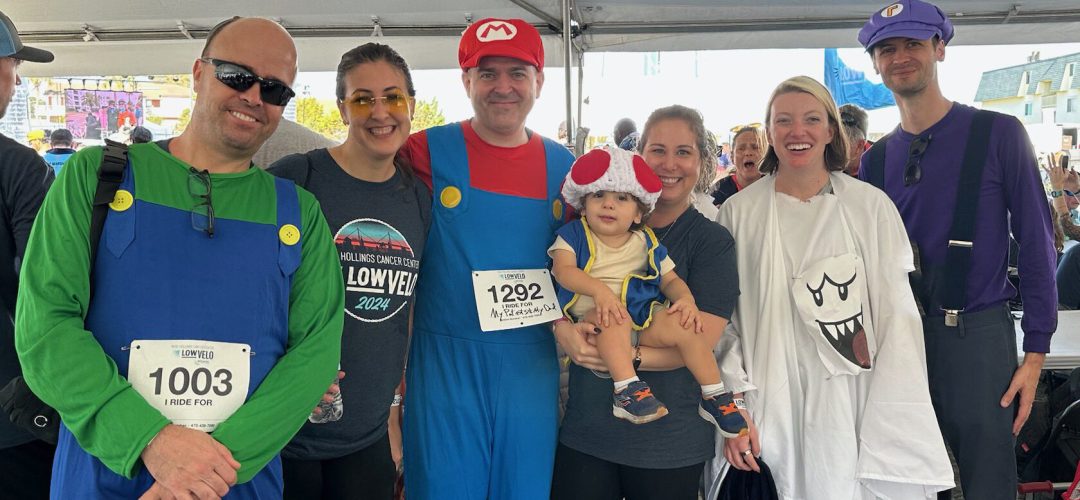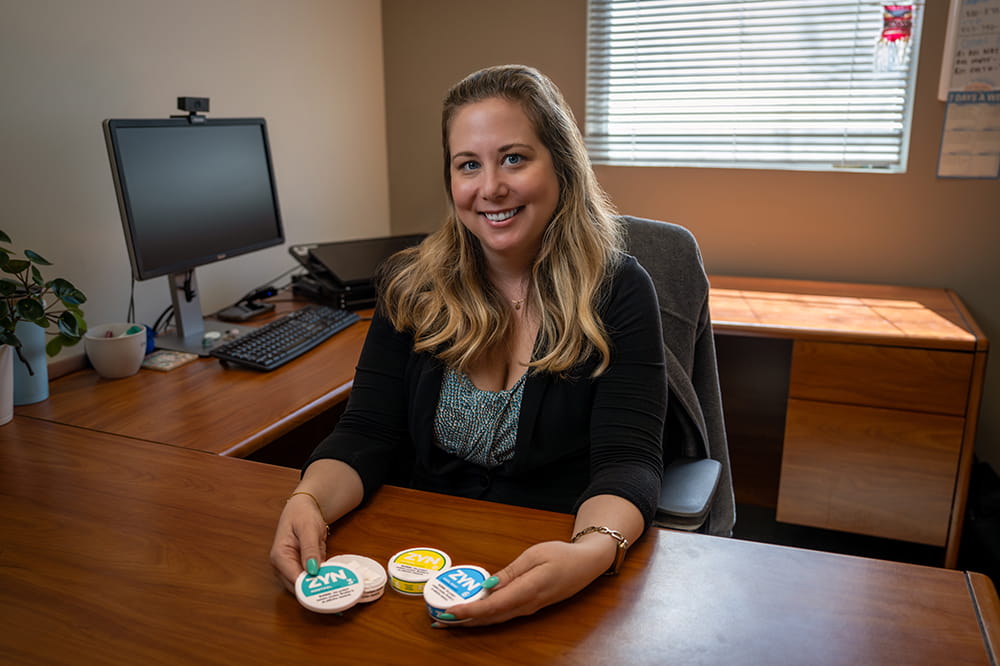Where the money goes: Developing novel treatments to help patients quit tobacco products

Jennifer Wilson | October 2, 2025
100% of the money raised by LOWVELO riders continues to provide critical funding to novel research projects at MUSC Hollings Cancer Center. One recent project that was funded by LOWVELO is Amanda Palmer, Ph.D.’s, “Biomarkers of Health Improvements After Abstinence from E-cigarettes and Combustible Cigarettes.”
Palmer is a research assistant professor in the MUSC Department of Public Health Sciences and a research member of the Hollings Cancer Prevention and Control Program. She is also a licensed clinical psychologist with the MUSC Health Tobacco Treatment Program and supervises pre-doctoral clinical psychology interns in the Charleston Consortium. Palmer’s research interests include health psychology and behavioral medicine, with an emphasis on tobacco use and cessation. Her most recent research projects focus on the use of e-cigarettes, oral nicotine pouches, and harm reduction.
Cigarette smoking has been decreasing among adults, but, at the same time, use of e-cigarettes (vaping) has dramatically increased. Therefore, e-cigarettes are forecasted to surpass cigarettes as the most popular tobacco product used in the U.S. Below, Palmer answers a few questions about her study that is evaluating changes in biomarkers of health, specifically related to cancer, respiratory, and cardiovascular risk, that may occur when people stop using e-cigarettes.
What is your background and how did you decide to pursue a career in medical research?
After finishing my undergraduate degree in psychology, my first job was as a research assistant at a major medical center. I saw that many important medical teams had psychologists working alongside them to help support patients in living healthier lifestyles. For example, following their diagnoses, cancer patients often needed support in quitting smoking and transplant patients sought help to quit alcohol.
I decided to pursue a doctoral degree in clinical psychology so that I could continue working as a part of these teams, and research ways to provide better treatments to patients. My career path thus far has focused on researching tobacco treatment, which led me to Hollings. I have had the pleasure of working alongside medical teams as well as other behavioral and biological researchers to continue my work in improving tobacco treatment and evaluating the health impact of stopping tobacco use.

Can you tell us a bit about your research project that is supported by LOWVELO funds?
We know that cigarette smoking is detrimental to health in a number of ways, such as impacting the lungs, cardiovascular system and immune system, and that it increases risk of cancer. Fortunately, we also know that quitting smoking is one of the best ways you can improve your health, and abstaining over time heals the body.
Recently, e-cigarettes have become very popular, especially for people who have not yet been able to quit smoking. Although they are less harmful than cigarettes, they are not risk-free, and more research is needed to understand their health impacts.
Funding from LOWVELO supported a project where we recruited individuals who used e-cigarettes and asked them to stop for one week. During that week, participants underwent several biological tests, including cardiovascular, respiratory, and immune system functioning, and DNA sample collection. We are still analyzing results, but from what we have seen so far, it appears that quitting e-cigarettes for one week shows improvement in some of these health measures.
What did the LOWVELO funding mean to you and your project? What did it make possible?
Funding from LOWVELO allowed our team to push the envelope in terms of the health outcomes we were able to look at. Without this financial support, we would not have been able to collaborate with basic science researchers. Some of these measures, like DNA damage and lung inflammation, have not ever been studied in people who quit e-cigarettes. The results of our research will be cutting-edge thanks to LOWVELO!
What are/were the next steps for this research?
As the use of e-cigarettes and other non-cigarette tobacco products (such as nicotine pouches) continues to rise, tobacco treatments will need to be adapted. My goal as a researcher is to develop and test treatments for quitting new tobacco products, like e-cigarettes. The results of the LOWVELO-funded study will provide us with a roadmap of what health effects we should look at in our treatment studies. This adds value to our science – we can find out the best ways to help people stop using tobacco and learn more about how their bodies benefit from quitting!
Are you participating in LOWVELO this year?
I am currently pregnant with my second baby due right around the time of the ride, so I have registered as a virtual participant under Team Tobacco Free! I plan to do a walk to honor LOWVELO.

